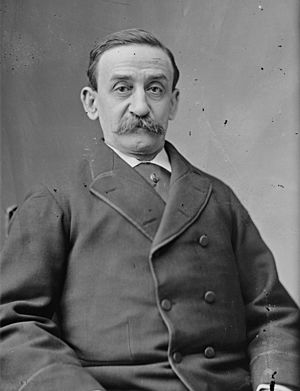Benjamin F. Jonas facts for kids
Quick facts for kids
Benjamin F. Jonas
|
|
|---|---|
 |
|
| United States Senator from Louisiana |
|
| In office March 4, 1879 – March 4, 1885 |
|
| Preceded by | James B. Eustis |
| Succeeded by | James B. Eustis |
| Member of the Louisiana House of Representatives | |
| In office 1865-1868 1876-1879 |
|
| Personal details | |
| Born |
Benjamin Franklin Jonas
July 19, 1834 Williamsport, Kentucky |
| Died | December 21, 1911 (aged 77) New Orleans, Louisiana |
| Political party | Democratic |
| Military service | |
| Allegiance | |
| Branch/service | |
| Years of service | 1861-1865 |
| Rank | |
| Battles/wars | American Civil War |
Benjamin Franklin Jonas (July 19, 1834 – December 21, 1911) was an important American politician. He served as a U.S. Senator for Louisiana and was a member of the Democratic Party. During the American Civil War, he was an officer in the Confederate States Army. Jonas was also one of the first Jewish people to serve in the U.S. Senate. He was the third Jewish Senator in U.S. history.
Contents
Benjamin Jonas's Early Life & Education
Benjamin Franklin Jonas was born on July 19, 1834, in Williamsport, Grant County, Kentucky. His father, Abraham Jonas, was a merchant and lawyer. When Benjamin was a boy, his family moved to Quincy, Illinois. His father became a Republican state lawmaker and postmaster there. He even knew Abraham Lincoln, who later became president.
Benjamin went to public schools in Quincy. In 1853, he moved to New Orleans, Louisiana. His uncle, Abraham Block, was a well-known person in the area. Benjamin studied law at the University of Louisiana, which is now called Tulane University. He finished his studies in 1855. After that, he became a lawyer and started his own practice in New Orleans.
Military Service in the Civil War
Even though his family had strong ties to the Republican Party, Benjamin Jonas decided to support the Southern states during the American Civil War. In 1862, he joined the Confederate States Army. He was part of Fenner's Battery and served as an Adjutant (a type of assistant officer) in an artillery battalion. He fought in the Army of Tennessee until the war ended. During his service, he rose to the rank of major.
Political Career in Louisiana
After the Civil War, Benjamin Jonas returned to New Orleans. He became very active in state politics as a Democrat.
Serving in the State Legislature
- In 1865, he was elected to the Louisiana House of Representatives. He served in this role until 1868.
- In 1872, he was elected to the Louisiana State Senate. However, he chose not to take the seat.
- He was elected to the state House of Representatives again in 1876.
City Attorney of New Orleans
In 1875, Benjamin Jonas was appointed as the city attorney for New Orleans. He held this important position until 1879.
Serving in the U.S. Senate
In 1879, Benjamin Jonas was elected to the United States Senate. He served as a U.S. Senator from March 4, 1879, to March 4, 1885. During his time in the Senate, he was the chairman of a committee called the Committee on Interior and Insular Affairs. This committee dealt with matters related to public lands and Native American affairs. He tried to be re-elected in 1884 but was not successful.
Later Life and Legacy
After his time in the Senate, Benjamin Jonas continued to serve the public. In 1885, he was appointed as the Collector of the port of New Orleans. He worked in this role until 1889. After that, he went back to practicing law.
Benjamin Jonas passed away in New Orleans on December 21, 1911. He was buried in the Dispersed of Judah Cemetery.
Jewish Senators in U.S. History
Benjamin Jonas was the second Jewish U.S. Senator from Louisiana. The first was Judah P. Benjamin, who served from 1853 to 1861. Overall, Jonas was the third Jewish Senator in U.S. history. The other two were Benjamin and David Levy Yulee from Florida.
It's important to note that while Yulee and Benjamin had Jewish backgrounds, they married Christian wives and did not openly practice Judaism later in life. Benjamin Jonas was the first Jewish Senator who openly practiced his faith. He was also the first Ashkenazi Jew to serve in the Senate. The earlier Jewish senators were of Sephardic descent. Today, most American Jews are Ashkenazi.

